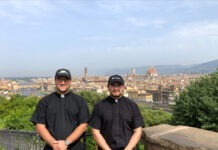From a Jesuit freshman roaming the halls of 12345 Inwood Road to a hedge fund manager supervising billions of dollars, Michael Corasaniti has been through a lot since graduating in 1983. Despite his many business ventures, Jesuit’s mark stays with him even today.
Flying in from New York before a later flight to Tulane, Corasaniti spoke to the Entrepreneurship Club on March 20 about his personal business experience and answered questions of the many curious club members. With the dialogue ranging anywhere from his drives to Jesuit with his father to the struggles he faced early in his business career, students learned a great deal about entrepreneurship as well as life.
Beginning with some background information about himself, students were captivated by the highs and lows of his career. From Jesuit, Corasaniti went to Tulane University and went to go work on Wall Street soon after. On his first day, October 19, 1987, the stock market had the largest single day drop in history, a day infamously known as Black Monday. After amassing a good deal of debt attending Tulane, he was only paid $1,000 a month, an amount that could barely pay rent. Even so, Corasaniti noted “I was doing something that I loved. I loved working on Wall Street.”
After some time, he worked at a bank doing bond trading and ultimately went to Colombia University and earned his MBA. Returning to Wall Street, he worked as a money manager running a mutual fund for a few years.
Living in New York on 9/11, Corasaniti lost many friends in the South Tower. This tragedy led to the next phase of his career. He became a board member at the company where many of his friends had perished and helped them reestablish their operations. After this difficult time, he went to work at a hedge fund before starting his own firm, Tourmalet Advisors, in 2009.
After this brief bio, he spoke on entrepreneurship in more general terms. Reflecting on his own career, he said, “It’s a job that’s not a job. It’s not work, it’s fun…It’s having a great idea and going for that great idea.” Corasaniti explained “I didn’t want to work at a place where my life was out of my control. And that’s sort of the beauty of entrepreneurship…It’s a form of self-control. [It’s saying] I’m gonna start my own business so I can control my own destiny…to do something I love.”
To better explain this, Corasaniti pointed to St. Ignatius. He noted that establishing a new order and drawing followers is much like starting a business, and St. Ignatius was incredibly successful in doing so despite the odds. Additionally, he looked at Ignatius’ teaching of the spirit of indifference, that, when applied to business, can be articulated as “I’m gonna do what I love, whether I’m gonna make money at it or not,” a critical skill of a successful entrepreneur. Still well-versed in St. Ignatius teaching, the indelible mark of Jesuit was clear in his speech.
With this mindset, Corasaniti explained that he would often have to make great sacrifices before finally prospering and enjoying the fruits of his hard work. He once even went three years without earning a salary. But when that great idea does arrive, he said he would often ask himself “Where’d that come from?” After years of experience in the business, he simply stated, “that idea comes from God.”
At this point, he went on to answer questions of the students that he described as “really good and pretty hard.” The questions he answered ranged from his time as a wealth manager to what it takes to be a good businessman. He spoke at great length of the relationship of many Jesuit values and the business world. He stated, “the overarching theme of entrepreneurship and business is to wake up and say ‘Is what I’m doing good for my client? Is this good for my consumer?'” Ultimately, he said that even in the business world, “you have to be a man for others.”
Candidly speaking of Jesuit, he noted that “This is a special place…What you will find in life is that there are tons of kids that you will meet that went to Jesuit schools and its a phenomenal connection…The philosophy that you learn here is taught everywhere in the world and it’s important.” Corasaniti also mentioned that he hires and likes working with Jesuit grads from around the country because of their common principles. Jared Ucherek ’15 commented that “it’s encouraging to see a Jesuit grad grow up, be successful in business, and hire Jesuit grads because of their work ethic.”
Nonetheless, knowledge of these Jesuit ideals alone is not enough for success. “The person who works the hardest, who puts in the most amount of hours, who listens…will typically have the most success,” Corasaniti noted. He encouraged students to “Put yourself in a position where you’re always learning and find a mentor, someone you can trust” and to apply what they have learned in their four years in their careers.
Despite his time as a hedge fund manager, Corasaniti advised that students not get involved in the business because of its great competitiveness, insisting that entrepreneurship can be easier than that. He said to “go get a good idea and go pray,” a process that has proven itself time and time again. In addition, Corasaniti suggested that, before entering the world of business that students read Heroic Leadership by Chris Lowney, Death in the Tall Grass by Peter Capstick, and Market Wizards by Jack Schwager.
With the counsel of Corasaniti, students were quite inspired. James Schroeder ’15, president of the Entrepreneurship Club, said, “it’s very encouraging to see a Jesuit grad who is so successful. Mr. Corasaniti started a hedge fund and it made me think that that could be me, any of the club members, or any Jesuit student in 25 years, making it big by starting their own company.” Ucherek furthered this, noting that “His application of the Jesuit ideals in his business which he founded 30 years after his graduation really shows the significance and importance the ideals hold.”
With the success to match the integrity of his operations, Corasaniti is truly a model for aspiring entrepreneurs. Despite his short time speaking with the club members, his influence will surely extend far beyond their conversation.






